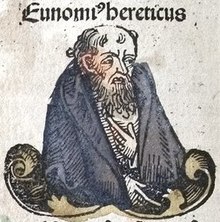

| Part of a series of articles on |
| Arianism |
|---|
| History and theology |
| Arian leaders |
| Other Arians |
| Modern semi-Arians |
| Opponents |
|
|
|
|
In4th-century Christianity, the Anomoeans[1] /ˌænəˈmiːənz/, and known also as Heterousians /ˌhɛtərəˈjuːʒənz/, Aetians /eɪˈiːʃənz/, or Eunomians /juːˈnoʊmiənz/, were a sect that held to a form of Arianism, that Jesus Christ was not of the same nature (consubstantial) as God the Father nor was of like nature (homoiousian), as maintained by the semi-Arians.[2]
The word anomoean comes from Greek ἀ(ν)- (an-) 'not' and ὅμοιος (omoios) 'similar', thus 'different; dissimilar'. In the 4th century, during the reign of Constantius II, this was the name by which the followers of Aëtius and Eunomius were described. The term heterousian derives from Greek ἑτεροούσιος, heterooúsios 'differing in substance' from ἕτερος, héteros 'another' and οὐσία, ousía 'substance, being'.
The semi-Arians condemned the Anomoeans in the Council of Seleucia, and the Anomoeans condemned the semi-Arians in their turn in the Councils of Constantinople and Antioch; erasing the word ὅμοιος (omoios) from the formula of Rimini and that of Constantinople and protesting that the Word had not only a different substance but also a will different from that of the Father. From that, they were to be called ἀνόμοιοι (anomoioi).
In the 5th century, the Anomoean presbyter Philostorgius wrote an Anomoean church history.[3]

{{cite encyclopedia}}: Missing or empty |title= (help)